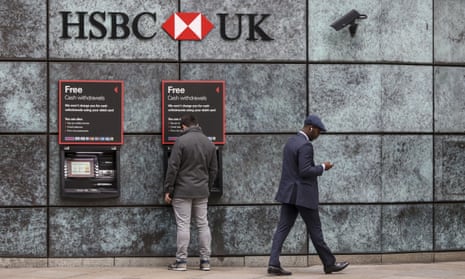HSBC could be the first major UK lender to charge customers for current accounts, as it tries to make up for the record low interest rates that have squeezed bank earnings during the Covid crisis.
The bank’s chief executive, Noel Quinn, said HSBC was not expecting to levy fees on basic accounts in the UK, the no-frills accounts provided for more vulnerable customers with poor credit scores that often place restrictions on daily cash withdrawals.
However, free banking could soon be over for most of the bank’s UK customers, who have standard bank accounts that offer overdraft facilities.
HSBC holds about 14% – or more than 9.8m – of the UK’s roughly 70m current accounts, according to figures released by the bank last year.
Quinn said the basic accounts would remain free to operate but added: “We will look in all our markets at the appropriate pricing strategy for fees and lending by customer segment to make sure we have a sustainable profitable business going forward.”
It would be a controversial decision in the UK, where most banks do not charge for current accounts. HSBC already charges for most bank accounts in other countries including Canada, the US and France, where customers are used to paying for banking services.
Quinn said the review on fees was directly linked to low interest rates in countries such as the UK, where rates were slashed to record lows of 0.1% in March. It has hit how much the bank can earn from interest on loans and mortgages, compared with how much it pays out on deposits,
“What we’ve got to do as an institution is look at ways that we can continue to grow our revenue in a low interest rate environment,” he said.
The Bank of England is also reviewing the possible use of negative interest rates and has told lenders to prepare for them. This could squeeze HSBC’s income even further. Banking insiders have warned that regular bank charges could be the consequence of a negative interest rate policy.
However, consumer group Which? warned it would be a “huge and risky move” if HSBC started charging for accounts, since customers could just switch banks.
“The danger for consumers is that if one of the big banks opens the door to charging fees, the others may follow suit – but competition for customers would hopefully dictate that there will be a range of attractive free accounts available for the foreseeable future,” said Gareth Shaw, head of money at Which?
HSBC also announced it would make deeper cost cuts just months after unveiling plans to slash about 35,000 staff worldwide. “We expect to reduce the group’s 2022 annual cost base beyond our original $31bn [£24bn] target, while sustaining investment in our focus areas,” the bank said.
The lender has already cut more than 6,300 jobs this year and expects that number to reach 10,000 by end of 2020.
The announcement came as HSBC’s pre-tax profits fell to $3.1bn in the three months to September, down 36% from $4.8bn during the same period last year. However, that easily beat analysts’ forecasts of $2.1bn.
Europe’s largest bank reported lower than expected provisions to cover a potential surge in defaults linked to the economic fallout of the pandemic. HSBC put aside $785m in the third quarter, less than half the $2bn forecast by analysts.
It brings the bank’s total impairment charge to $7.6bn for the year to date, after setting aside $3bn and $3.8bn in the first and second quarters respectively.
HSBC said it expected loan loss charges for the whole of 2020 to be at the lower end of the $8bn to $13bn range it outlined earlier this year, claiming the likelihood of a major economic downturn was “low”.
However, the chief financial officer, Ewen Stevenson, warned that a no-deal Brexit would force it to set aside more cash for bad debts. “I would put a big health warning around Brexit. It is within our planning assumptions currently that there will be a trade agreement. If that was to change, we could see a material further step up in the provisioning in [the] fourth quarter.”
Quinn said he was keen to restart shareholder dividends, after the Bank of England forced lenders to cancel the payouts due to the Covid outbreak. He said it would depend on economic conditions in early 2021, as well as consultations with regulators. “We will seek to pay a conservative dividend if circumstances allow,” he said.
HSBC shares were up nearly 4% at 330p each in afternoon trading, but are down more than 40% since February.
